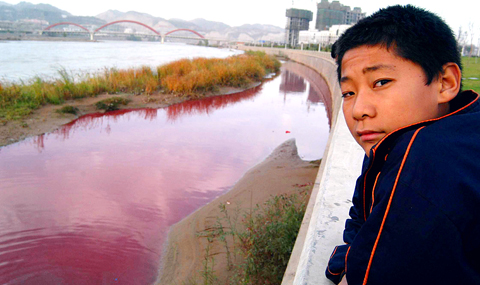Newly released scientific results show one-third of the famed Yellow River, which supplies water to millions of people in northern China, is heavily polluted by industrial waste and unsafe for any use.
The Yellow River, the second-longest in China, has seen its water quality deteriorate rapidly in the last few years, as discharge from factories increases and water levels drop because of diversion for booming cities.
The river supplies a region chronically short of water but rich in industry.

PHOTO: AP
The Yellow River Conservancy Committee said 33.8 percent of the river’s water sampled registered worse than Level 5, meaning it’s unfit for drinking, aquaculture, industrial use and even agriculture, according to criteria used by the UN Environmental Program.
A survey last year covered more than 13,492km of the river, which flows from western Qinghai Province across China into the Bohai sea, and its tributaries, a notice posted on the committee’s Web site on Saturday said.
Only 16.1 percent of the river samples reached Level 1 or 2 — water considered safe for household use.
Industry and manufacturing made up 70 percent of the discharge into the river, the notice said, with 23 percent coming from households and 6.4 percent from other sources. The notice did not identify specific pollutants.
The results showed pollution has gotten slightly worse since 2006, when 31 percent of the water in the river was poorer than a Level 5, according to an earlier survey.
“It’s not surprising,” said Wen Bo of the San Francisco, California-based environmental group Pacific Environment.
Many polluting firms in the upper and middle reaches of Yellow River have not been well monitored by local governments, and even protected because they give jobs to workers, said Wen, who is the organization’s China program director.
There is also no mechanism for richer provinces downstream to help the poorer ones upstream clean up, he said.
“They are just treating the river as a dumping site,” Wen said. “It’s basically a sewage channel for the provinces that share the river.”
Some of the world’s most polluted cities are in China, where many rivers and lakes are toxic after decades of breakneck industrial and economic growth.
In February pollution turned part of a major river system in central China red and foamy, forcing authorities to cut water supplies to as many as 200,000 people.
In one of China’s worst cases of river pollution, potentially cancer-causing chemicals, including benzene, spilled into the Songhua River in November 2005.
The northeastern city of Harbin was forced to sever water supplies to 3.8 million people for five days.
Pollution in China’s waterways remains “grave,” according to a June report by the Ministry of Environmental Protection on the state of the environment last year.
More than 20 percent of water tested in nearly 200 rivers was not safe to use, it said.
The ministry has tried to shut down polluting factories along China’s main waterways, but its power is limited because local environmental protection bureaus are under the control of local governments.

Drug lord Jose Adolfo Macias Villamar, alias “Fito,” was Ecuador’s most-wanted fugitive before his arrest on Wednesday, more than a year after he escaped prison from where he commanded the country’s leading criminal gang. The former taxi driver turned crime boss became the prime target of law enforcement early last year after escaping from a prison in the southwestern port of Guayaquil. Ecuadoran President Daniel Noboa’s government released “wanted” posters with images of his face and offered US$1 million for information leading to his capture. In a country plagued by crime, members of Fito’s gang, Los Choneros, have responded with violence, using car

The team behind the long-awaited Vera Rubin Observatory in Chile yesterday published their first images, revealing breathtaking views of star-forming regions as well as distant galaxies. More than two decades in the making, the giant US-funded telescope sits perched at the summit of Cerro Pachon in central Chile, where dark skies and dry air provide ideal conditions for observing the cosmos. One of the debut images is a composite of 678 exposures taken over just seven hours, capturing the Trifid Nebula and the Lagoon Nebula — both several thousand light-years from Earth — glowing in vivid pinks against orange-red backdrops. The new image

CYBERCRIME, TRAFFICKING: A ‘pattern of state failures’ allowed the billion-dollar industry to flourish, including failures to investigate human rights abuses, it said Human rights group Amnesty International yesterday accused Cambodia’s government of “deliberately ignoring” abuses by cybercrime gangs that have trafficked people from across the world, including children, into slavery at brutal scam compounds. The London-based group said in a report that it had identified 53 scam centers and dozens more suspected sites across the country, including in the Southeast Asian nation’s capital, Phnom Penh. The prison-like compounds were ringed by high fences with razor wire, guarded by armed men and staffed by trafficking victims forced to defraud people across the globe, with those inside subjected to punishments including shocks from electric batons, confinement

Canada and the EU on Monday signed a defense and security pact as the transatlantic partners seek to better confront Russia, with worries over Washington’s reliability under US President Donald Trump. The deal was announced after a summit in Brussels between Canadian Prime Minister Mark Carney and European Commission President Ursula von der Leyen and European Council President Antonio Costa. “While NATO remains the cornerstone of our collective defense, this partnership will allow us to strengthen our preparedness ... to invest more and to invest smarter,” Costa told a news conference. “It opens new opportunities for companies on both sides of the